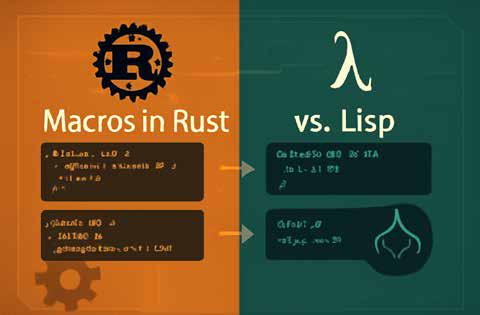試す 金 - 無料
Macros in Rust vs Lisp: A Comparison of their Metaprogramming Power
Open Source For You
|June 2025
This comparative study of macros in Lisp and Rust highlights not only their technical differences but also the philosophies that guide their design.

Metaprogramming is the technique of writing programs that can generate, transform, or analyse other programs—or even themselves. It allows developers to operate at a higher level of abstraction, automate boilerplate code, and implement custom behaviours that the base language may not natively support. By shifting some work from runtime to compile time (or from manual labour to automation), metaprogramming plays a critical role in enhancing code efficiency, reusability, and expressiveness.
One of the most powerful tools for metaprogramming is the macro. Macros allow developers to manipulate code as data—intercepting and transforming code before it is executed. Unlike functions, which operate on values, macros operate on the structure of code itself. This capability makes them ideal for defining domain-specific languages (DSLs), implementing compile-time checks, or eliminating repetitive code patterns. Let's compare Rust and Lisp, two languages known for their powerful macro systems but with drastically different approaches.
Why compare Rust and Lisp specifically
Rust and Lisp offer two of the most distinctive and influential macro systems in modern programming, making them ideal for a comparative study of metaprogramming. In contrast to Lisp, Rust is a modern systems programming language designed with an emphasis on safety, concurrency, and performance. Despite its strict and static type system, Rust embraces metaprogramming through two macro systems: declarative macros (macro_rules!) and procedural macros, which operate at the abstract syntax tree (AST) level. Rust's macros are carefully engineered to integrate tightly with the compiler's hygiene, type-checking, and error reporting systems—offering powerful compile-time capabilities while minimising unintended side effects.
Understanding macros
このストーリーは、Open Source For You の June 2025 版からのものです。
Magzter GOLD を購読すると、厳選された何千ものプレミアム記事や、10,000 以上の雑誌や新聞にアクセスできます。
すでに購読者ですか? サインイン
Open Source For You からのその他のストーリー

Open Source For You
Top 10 Open Source Tools for System and IT Administrators
All reputed online services have committed system and IT administrators working behind the scenes. Here are ten open source tools they should be aware of, as these can help them monitor, automate, as well as manage complex infrastructure with relative ease.
6 mins
February 2026
Open Source For You
Google opens access to its Gemini Deep Research Agent
Google has opened access to its Gemini Deep Research Agent for the first time, allowing developers to integrate advanced autonomous research capabilities directly into their applications.
1 min
February 2026

Open Source For You
NVIDIA buys SchedMD, keeps Slurm open source and vendor neutral
NVIDIA has acquired AI software company SchedMD, signalling a deeper commitment to open source technologies as competition intensifies across the artificial intelligence ecosystem.
1 min
February 2026

Open Source For You
How Open Source Tools Power Modern IT Operations
Open source tools have not replaced enterprise IT platforms; they have become the connective layer that makes modern operations possible.
6 mins
February 2026
Open Source For You
Mandiant's Auralnspector enhances Salesforce security
Google-owned cybersecurity firm Mandiant has released AuraInspector, a free, open source command-line tool designed to identify dangerous access control misconfigurations in Salesforce environments, marking a significant move to democratise enterprise-grade security testing.
1 min
February 2026
Open Source For You
Google launches Universal Commerce Protocol to power agentic AI commerce
Google has introduced the Universal Commerce Protocol (UCP), a new open standard that enables AI agents to autonomously perform end-to-end commerce activities, spanning product discovery, purchasing, checkout, payments, and postpurchase experiences.
1 min
February 2026

Open Source For You
Zero Trust CI/CD: The Death of Static Secrets
In an era where data breach costs continue to hit record highs, shifting to a secretless CI/CD pipeline is the most effective step to safeguard digital infrastructure.
7 mins
February 2026

Open Source For You
Quantum Algorithms: The Future of Computing
Explore the essence of quantum algorithms, their groundbreaking applications, recent innovations, and the challenges that remain.
8 mins
February 2026

Open Source For You
Bringing Clarity to the Chaos in AI
AI feels powerful, yet most teams struggle because they cannot define what intelligence they really need. But there are ways to address this challenge.
5 mins
February 2026

Open Source For You
Top researchers return to OpenAI
OpenAI has welcomed back three high-profile researchers, Barret Zoph, Luke Metz, and Sam Schoenholz, following their brief tenure at former OpenAI CTO Mira Murati's AI startup, Thinking Machines.
1 min
February 2026
Listen
Translate
Change font size

